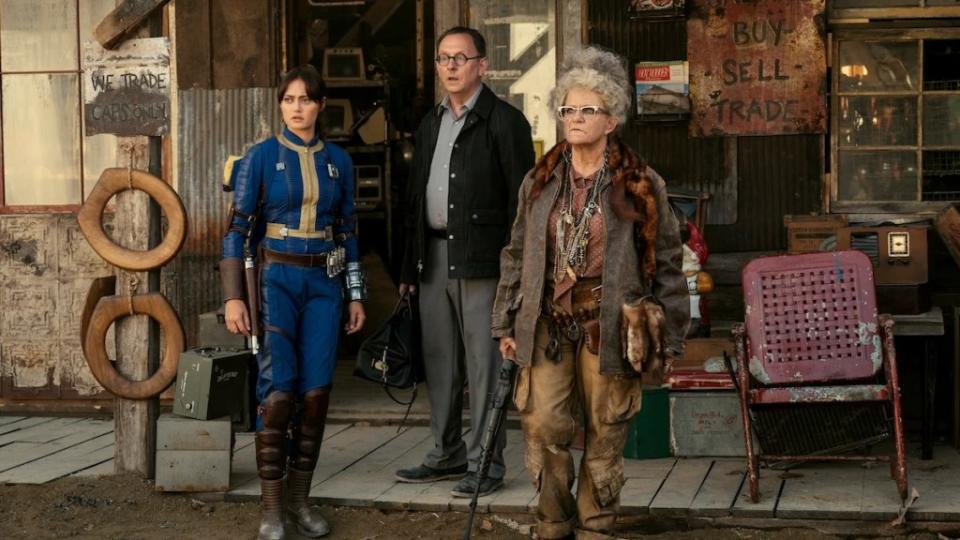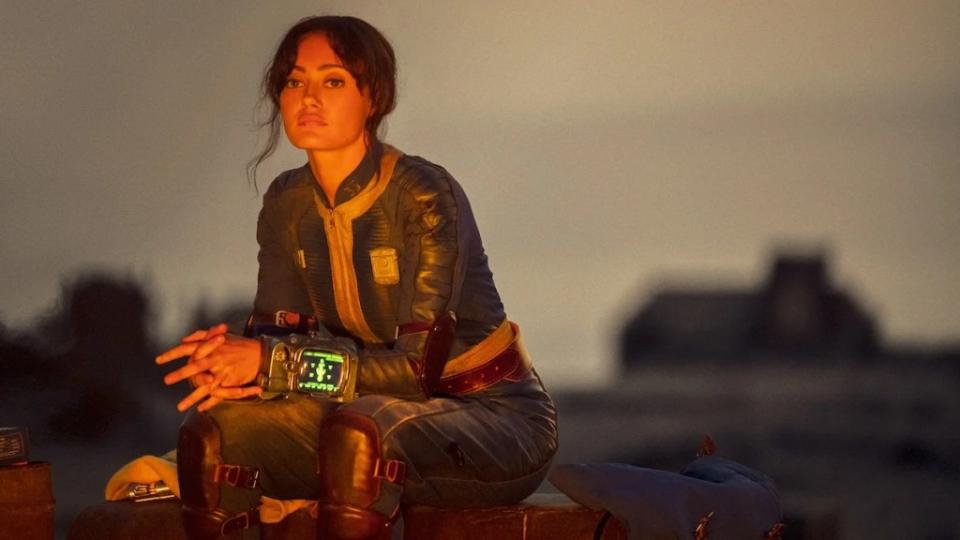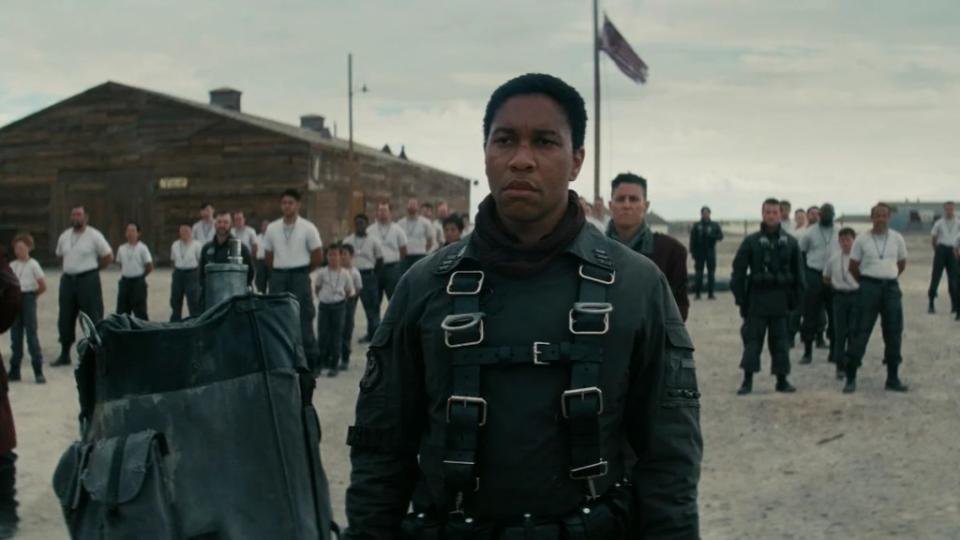‘Fallout’ Review: Walton Goggins Is the Monstrous Heart of Amazon’s Lively Video Game Adaptation
- Oops!Something went wrong.Please try again later.
- Oops!Something went wrong.Please try again later.
“War never changes.” This treatise is the consistent throughline of the “Fallout” video game series, a nifty tagline to establish the dire post-apocalyptic nature of the long-running Bethesda Game Studios title. It also doubles as a fitting axiom for a different kind of battle: the IP wars. It’s easy to compare countries competing in a nuclear arms race to various studios looking to stockpile their arsenals with exclusive content.
Prime Video’s “Fallout” adaptation arrives as a new IP battle begins to take shape. As the power and viability of the old resource — comic book adaptations — start to wane, Hollywood is mining the rich vein of video game lore for the future of franchises. Even before the launch of “Fallout,” the last few years of live-action translations of “Halo,” “The Last of Us” and “Twisted Metal” showed that the adult game-to-prestige-series pipeline is off to a promising start. One could say this shift mirrors the suggested transition from fossil fuels to nuclear power in the middle of the last century.
The oil-to-nuclear metaphor is particularly potent in “Fallout”. Set in the year 2077, a sudden nuclear war breaks out across the Earth. Sensing the end of days, certain Americans (read: the wealthy) sought refuge in underground bunkers. These vaults, created by the aptly named Vault-Tec corporation, have allowed those ensconced inside to live on until the surface is inhabitable again. Inside Vault 33, Lucy MacLean (Ella Purnell) is living a cushy life alongside her father Hank (Kyle MacLachlan), brother Norm (Moisés Arias), and the rest of her fellow vault-dwellers — until a predicament forces her onto the surface to see what’s left of America.
The former city of Los Angeles is now a barren territory, full of threats awaiting Lucy, including violent humans, irradiated water, oversized cockroaches and more. As her quest progresses, she encounters figures trying to make their own way in this broken world. The first is Maximus (Aaron Moten), a squire in the Brotherhood of Steel, a militaristic and Arthurian organization obsessed with imposing some sort of order upon the Wasteland through their iconic metal power armor. The second is the polar opposite, a living personification of chaos known simply as “The Ghoul” (Walton Goggins), a former Hollywood actor known as Cooper Howard before the bombs went off. How and why Cooper is still alive is one of the big mysteries in “Fallout,” and his arc helps set the show apart from its gaming origins.
Unlike other game-to-series adaptations, nearly identical one-to-one recreations of the source material, “Fallout” takes the tenor, tone, look and feel of the beloved Bethesda Game Studios franchise and uses it all as the foundation upon which to craft a new story. Jonathan Nolan and Lisa Joy are the splashy creatives on the marquee, who know a thing or two about leveraging dystopian IP from their tenure on “Westworld.” The day-to-day showrunning falls to Geneva Robertson-Dworet (cowriter of Captain Marvel) and Graham Wagner (“The Office,” “Silicon Valley,” and “Portlandia”).
The resulting creative pairing is an explosively entertaining fusion; Nolan brings his unique vision and penchant for world-building to the series directing the first three of eight episodes in the season, while Wagner and Robertson-Dworet capture the spirit of the game in wonderful ways. Yes, the games’ darkness and oppressive post-apocalyptic nature are ever present, but the comedic elements are hilariously in play as well. To wit: as Lucy prepares for her wedding night early on in the first episode, she succinctly and earnestly tells her crestfallen cousin that “Messing around with your cousin is well and good for kids, but it’s not a long-term sustainable sexual practice.” It helps that the series also reinforces its comedy bonafides by dotting the cast with funny performers like Zach Cherry, Johnny Pemberton, Jon Daly, Chris Parnell and Matt Berry.

Finding a tonal balance between the drama and the comedy is a razor’s edge, but “Fallout” makes it look effortless. As a result, spending time in this hardened world is as fun, engaging, and engrossing as the games. The production design from Howard Cummings, reteaming with Nolan and Joy from “Westworld,” is absolutely staggering. Much like with “The Lord of the Rings: The Rings of Power,” it appears that Amazon spared no expense in providing the proper resources needed to bring “Fallout” to life accordingly. That extends to the franchise’s aesthetic obsession with 1940s cultural nostalgia, which is lovingly rendered through the clothes, cars and music throughout the show.
As for its narrative, “Fallout” starts extremely focused before taking some interesting detours in the back half of the season — or, as The Ghoul puts it, “Thou shalt get sidetracked.” Structurally speaking, the diversions give further backstory into The Ghoul’s pre-bomb past, allowing Goggins to shine (more on that in a second) while providing a continued focus on the series’ excellent world-building. Without giving too much away, the latter stretch digs deep into the history of Vault-Tec, providing a fertile ground for a sharply executed exploration of corporate capitalism. Fans of the game will want to pay close attention to this stretch given that Bethesda director Todd Howard confirmed the events of the show are canon to the overarching lore, serving as a pseudo “Fallout 5” until that game is eventually released.
The impact of these revelations might be polarizing for diehard fans, but will likely still be very effective for casual viewers because they work extremely well within the context of the story Wagner and Robertson-Dworet are telling. The continued morality lessons Lucy learns in this backstretch are less impactful and feel slightly repetitive in light of the first half. It also makes the season finale, while deeply satisfying from an emotional perspective, feel slightly rushed in favor of making space for these otherwise entertaining interludes. Speed bumps aside, the episodes house an exciting and fresh story that elevates “Fallout” far beyond what it would have been as a step-by-step reenactment of its source material.

Performance-wise, keen viewers of Goggins’ career have known for quite a while that the stalwart actor has the goods, and the show doesn’t hesitate to provide one showcase moment after another. Goggins gets the full emotional spectrum to play with here — comedy, tragedy, action, adventure and more. He’s on front street from the moment the series starts and is its bleeding emotional heart.
Purnell is superlative, too, playing Lucy with a doe-eyed naiveté and earnestness. The tone is reminiscent of what Chris Evans brought to his performance as Captain America in “The First Avenger,” but Wagner and Robertson-Dworet bolster her wide-eyed-wonder with serious comedic bonafides and a hilariously cavalier outlook towards intimacy, which give Purnell the biggest laugh lines of the season. It’s no surprise that “Fallout” crackles like a Geiger counter in the red during the moments Goggins and Purnell are on-screen together — something the show should lean into even more for its potential second season.
Moten’s early stage plots under the thumb of the Brotherhood are his weakest. Once he ventures out in the world and begins interacting with the other two leads, things improve considerably — especially when he and Purnell get together as their slightly sheltered worldviews collide and contrast in engaging ways. But it definitely takes a few episodes for his character to totally click, which feels more like a function of the script and less about Moten’s performance.

Despite the visual trappings that make “Fallout” feel stuck in the past, the series is decidedly about the future and the little things people can do to make tomorrow slightly better than today. Ultimately, the proposed move from fossil fuels to nuclear power didn’t pan out. It’s still too early to make an official ruling on whether or not video game adaptations are the new resource for Hollywood, but they continue to arrive all the same. The key will be to ensure these future projects are as well-made, executed, and — well — as much of a blast as “Fallout” is throughout its first season.
“Fallout” premieres at 9 p.m. ET/6 p.m. PT Wednesday, April 10, on Prime Video.
The post ‘Fallout’ Review: Walton Goggins Is the Monstrous Heart of Amazon’s Lively Video Game Adaptation appeared first on TheWrap.

